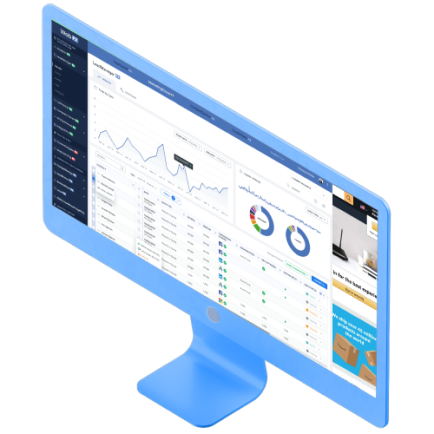-
 7 min. read
7 min. read
-
 Kevin Randolph
Kevin Randolph Content Writer
Content Writer
- Kevin is a Google Analytics-certified marketing specialist at WebFX, focusing on content marketing, SEO, and email marketing. He has a BA with a double major in mass communications and languages & cultures. When not writing and optimizing website content, Kevin enjoys playing bass guitar, hiking, and taking road trips.
When it comes to running a business, there’s an endless list of things to do. Even just marketing your business comes with a seemingly infinite list of tasks to check off. The key, though, is working smarter rather than harder.
With marketing automation, you can use smart technology to save time and improve your results. How does marketing automation work, though, and can your company really use it? Yes!
Find out how in our marketing automation guide. Join 200,000 smart marketers and get the month’s hottest marketing news and insights delivered straight to your inbox! “*” indicates required fields (Don’t worry, we’ll never share your information!)Don’t miss our Marketing Manager Insider emails!
Enter your email below:
Inline Subscription Form – CTA 72

Marketing automation definition: What is marketing automation?
Marketing automation is the use of technology to accomplish marketing tasks without manual input. Marketing automation software can automatically complete repetitive work associated with email, social media, advertising, and other types of digital marketing.
Why use marketing automation?
Before you dive further into this marketing automation guide, you might want to know why you should use marketing automation.
Here are some of the many benefits it can provide:
Saves time
One of the most significant benefits of marketing automation is the fact that it can save you a tremendous amount of time. As your company grows and your marketing efforts expand, it becomes more difficult to do everything manually. The more time you currently spend doing repetitive marketing-related tasks, the more potential value you can get from automated marketing.
Frees up your team
Marketing automation software can take care of repetitive tasks like compiling data and sending emails.
It also lets you schedule things in advance, like posting to social media. With automation tools, you can schedule multiple posts instead of logging into your social accounts every time you want to post. When automation frees your team from doing repetitive tasks manually, they have more time to focus on high-value projects that require critical thinking and human input.
Improves user experience
A marketing automation strategy can help you collect, organize, and analyze data about your audience, which helps you understand their interests, needs, and preferences better.
When you know your audience, you have a better idea of how to improve their experience. You can even personalize your content marketing to groups of users or individual users with the help of marketing automation.
Helps you collect and manage data
Automation tools can also help you collect, organize, and analyze your marketing data. With the right tools, you can collect more data than you otherwise would, store it all in one place, and get valuable insights from it.
The data and insights you can get from marketing automation are useful for numerous things, from personalizing content to evaluating campaign performance to determining which of your products is most popular with various audiences.
Helps you measure, analyze, and optimize marketing performance
Marketing automation can also help you collect data about your marketing campaigns’ performance. You can use this data to assess how effective your campaigns are and determine how you can improve them. As you collect campaign performance data over time, you can gradually refine your strategies and increase your campaigns’ effectiveness.
Helps you discover marketing trends
Analyzing marketing data can also help you uncover trends — in your own marketing, in your industry, and in the wider marketing world — that you can use to improve your strategies.
For example, our marketing automation software here at WebFX, MarketingCloudFX, uses Google AI machine learning to help you stay ahead of trends. One platform tracking countless metrics and driving stellar results.Meet MarketingCloudFX:


Helps you track and learn about leads
Marketing automation tools can also help you track leads and learn more about them, which allows marketing teams to pass on better information to sales teams. Additionally, learning more about your audience and improving your marketing campaigns can help attract better-qualified leads.
All these benefits can lead to increased sales.
Improves your return on investment (ROI)
Overall, marketing automation can help you improve your marketing, generate better leads, and close more sales. It also helps you save time and money on your marketing. The result?
Improved marketing return on investment (ROI).
How marketing automation works
Effective marketing automation relies on data. When your audience interacts with a piece of marketing technology, such as a website with Google Analytics tracking set up or an email marketing list, you gather data from them. You can then use that data to improve your interactions with them and accomplish certain tasks automatically.
More basic marketing automation tools may involve simply completing repetitive, manual marketing tasks using technology instead of human input. For example, you can schedule welcome emails and social media posts. High-quality marketing automation tools will engage your contacts at a time when they’re most likely to convert into sales, based on the data they gather.
What are examples of marketing automation?
What does using marketing automation actually look like in the day-to-day operations of a business?
Here are some of the most common uses of marketing automation.
Send emails and manage email campaigns
Email marketing is one of the most common channels in which marketers use automation. You can schedule emails ahead of time, collect data about subscribers, and segment your subscriber lists. You can even set triggers to send emails when certain events occur, such as a user abandoning their shopping cart.
With drip campaigns, you can send certain groups of users specific emails following a schedule to move them toward converting. For example, for users who requested a free trial of the software you sell, you might send periodic emails educating them about the software and then encouraging them to make a purchase.
Schedule social media posts
Another common marketing automation example is scheduling social media posts ahead of time. This approach enables you to schedule multiple posts at once instead of logging in every time you want to post, saving you time.
Personalize content
Using personalization, you can automatically adjust marketing content such as ads, website content, and emails, to match users’ preferences, interests, and place in the marketing funnel. This personalization leads to a better user experience and, often, more conversions.
Conduct A/B testing
A/B testing is another valuable use of marketing automation. This approach involves creating two versions of a web page, ad, or other marketing asset and showing each version to a different audience to see which gets the best response.
For example, you might change the header image on a web page and see which version of the page gets the most engagement. Marketing automation tools can automatically split your audience into groups, calculate the results, and show you which version performed better in the test.
Track marketing performance
Marketing automation tools can automatically generate reports about your marketing campaigns, making it easier to track your marketing performance and ROI.
Track online buyers’ journeys
Automatically collecting marketing data can help you uncover trends related to your buyers’ journeys, allowing you to improve your campaigns. For example, if you see a certain demographic of users interacts the most with ads, you might show those users more ads.
Score leads
Marketing automation can help you automatically score leads using the data you collect.
Automation helps you more quickly decide which leads to pursue and turn into customers.
Improve website user experience
Similarly, you might look at data about how people use your website and uncover ways to improve it. For example, if users frequently exit from your checkout page, you might need to assess that page and evaluate what’s causing users to leave. Are you interested in custom reporting that is specific to your unique business needs? Powered by MarketingCloudFX, WebFX creates custom reports based on the metrics that matter most to your company.Measuring the metrics that affect your bottom line.
Learn More 

Our marketing automation platform: MarketingCloudFX
MarketingCloudFX is our marketing automation platform here at WebFX.
Using the platform, you can track your marketing campaigns’ performance, conduct industry research, and calculate your ROI. MarketingCloudFX also uses artificial intelligence (AI) powered by IBM Watson to help you analyze your results and make strategic decisions. The platform includes numerous tools to help you manage and automate your digital marketing, including:
- EmailMarketingFX: With EmailMarketingFX, you can manage your email marketing, set up segmentation, A/B test your emails, and track your results.
- LeadManagerFX: Get reports about new leads and where they come from, track how they move throughout your website, and collect data that helps you convert them.
- PersonalizeFX: Use data to customize your website experience according to users’ industry, location, previous activity on your website, and other factors.
That’s just a small sample of the functionalities available with our digital marketing automation platform. Learn more about MarketingCloudFX.
Get started with marketing automation
After reading through this marketing automation guide, are you ready to start automating your marketing? Contact us online or call us at 888-601-5359 to learn more about how MarketingCloudFX and our marketing automation services can make your marketing more efficient and improve your campaigns’ results.
-
 Kevin is a Google Analytics-certified marketing specialist at WebFX, focusing on content marketing, SEO, and email marketing. He has a BA with a double major in mass communications and languages & cultures. When not writing and optimizing website content, Kevin enjoys playing bass guitar, hiking, and taking road trips.
Kevin is a Google Analytics-certified marketing specialist at WebFX, focusing on content marketing, SEO, and email marketing. He has a BA with a double major in mass communications and languages & cultures. When not writing and optimizing website content, Kevin enjoys playing bass guitar, hiking, and taking road trips. -

WebFX is a full-service marketing agency with 1,100+ client reviews and a 4.9-star rating on Clutch! Find out how our expert team and revenue-accelerating tech can drive results for you! Learn more
Try our free Marketing Calculator
Craft a tailored online marketing strategy! Utilize our free Internet marketing calculator for a custom plan based on your location, reach, timeframe, and budget.
Plan Your Marketing Budget

Maximize Your Marketing ROI
Claim your free eBook packed with proven strategies to boost your marketing efforts.
Get the GuideTry our free Marketing Calculator
Craft a tailored online marketing strategy! Utilize our free Internet marketing calculator for a custom plan based on your location, reach, timeframe, and budget.
Plan Your Marketing Budget





